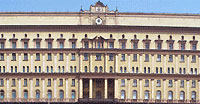Russian MPs Downplay New Internet Surveillance Plans, Activist Alarmed

(RIA Novosti – October 21, 2013) Russian State Duma MPs have downplayed the significance of the Communications Ministry’s draft decree requiring internet service providers to install equipment for storing internet traffic and sharing it with the Federal Security Service (FSB), Russian news agencies reported on 21 October. The Russian heavyweight liberal newspaper Kommersant reported earlier on the same day that the Russian Ministry of Telecommunications and Mass Communications had prepared a draft decree requiring internet service providers to install by 1 July 2014 equipment for recording and storing internet traffic data for at least 12 hours and making it available for the secret services, the Russian state news agency RIA Novosti said.
The Russian State Duma’s deputy speaker, Sergey Zheleznyak, who is also in charge of the State Duma’s information technology body, said that internet service providers had already been cooperating with the secret services. “In case somebody does not know, today, too, internet service providers actively and voluntarily cooperate with the secret service because not a single company, nor a single citizen, I would hope, would be interested in concealing information that could be used in exposing a criminal and brining him to account,” Zheleznyak told RIA Novosti.
Certain contact between internet service providers and secret services had already existed before, the head of the Russian State Duma committee for information policy, Aleksey Mitrofanov, said, as further reported by RIA Novosti.
“Certain contact and a transfer system had existed before but this is not news. However, it is another matter that the technology of recording information for a certain period of time is being introduced,” Mitrofanov said. He added that a similar system existed in all the countries of the world.
“There are no violations of the constitution,” he added.
In turn, the deputy head of the State Duma committee for security and combating corruption, Aleksandr Khinshteyn, said that he did not see anything “reprehensible” in the draft decree, as reported by the Russian Gazprom-owned, editorially independent news agency Ekho Moskvy on the same day. “I do not see anything reprehensible in this. Undoubtedly, there should be certain defence mechanisms. If you visit decent and normal websites, then you have nothing to be ashamed of or fear,” he said.
“Anyway, this data will only be available to certain bodies,” he added.
Explaining the draft decree, the director of the Russian Communications Ministry’s department for external communications, Yekaterina Osadchaya, said that there was “nothing extraordinary” about it, Ekho Moskvy reported later on the same day.
“This decree only regulates some tasks. Internet service providers have already been working with the secret services for a long time. This is security and there is nothing extraordinary about it,” Osadchaya said.
She said that “nothing will change for internet service providers” and that “they had this equipment before”.
“They had bought this equipment, installed it and had been required to install it on the network and switch it on,” Osadchaya added.
At the same time, leader of Just Russia party faction in the State Duma Sergey Mironov said that the draft decree violated the Russian constitution. “If what was written (by Kommersant newspaper) is true, then this is a direct violation of the constitution,” Mironov said, as reported by RIA Novosti.
Rights activist alarmed
Meanwhile, one of the leaders of the Russian human rights organization Memorial, Yan Rachinskiy, said that the Communications Ministry’s draft decree would need to be checked, Ekho Moskvy reported later on the same day.
The decree “will have to be thoroughly checked for conformity with the constitution or Russia’s international obligations”, Rachinskiy said.
“It is naturally unclear why such a draft law emerges without any discussion since it is certainly connected to civil rights,” he added.
“This is a continuation of the dangerous path of expanding the jurisdiction of secret services without judicial control and any control at all,” Rachinskiy said.
